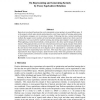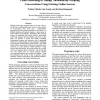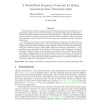15 search results - page 2 / 3 » Generating Fuzzy Models from Deep Knowledge: Robustness and ... |
JMLR
2006
13 years 5 months ago
2006
Kernels are two-placed functions that can be interpreted as inner products in some Hilbert space. It is this property which makes kernels predestinated to carry linear models of l...
ICWSM
2009
13 years 3 months ago
2009
Hearing people argue opposing sides of an issue can be a useful way to understand the topic; however, these debates or conversations often don't exist. Unfortunately, generat...
WISE
2003
Springer
13 years 10 months ago
2003
Springer
At the heart of today’s information-explosion problems are issues involving semantics, mutual understanding, concept matching, and interoperability. Ontologies and the Semantic ...
WCRE
2003
IEEE
13 years 10 months ago
2003
IEEE
Reverse Engineering is a process fraught with imperfections. The importance of dealing with non-precise, possibly inconsistent data explicitly when interacting with the reverse en...
CORR
2008
Springer
13 years 5 months ago
2008
Springer
Mining frequent itemsets is a popular method for finding associated items in databases. For this method, support, the co-occurrence frequency of the items which form an associatio...



